Land Rover Range Rover Sport vs Porsche Taycan - Differences and prices compared
Compare performance (635 HP vs 1034 HP), boot space and price (78600 £ vs 87900 £ ) at a glance. Find out which car is the better choice for you – Land Rover Range Rover Sport or Porsche Taycan?
Costs and Efficiency:
Price and efficiency are often the first things buyers look at. Here it becomes clear which model has the long-term edge – whether at the pump, the plug, or in purchase price.
Land Rover Range Rover Sport has a slightly advantage in terms of price – it starts at 78600 £ , while the Porsche Taycan costs 87900 £ . That’s a price difference of around 9342 £.
As for electric range, the Porsche Taycan performs significantly better – achieving up to 680 km, about 562 km more than the Land Rover Range Rover Sport.
Engine and Performance:
Power, torque and acceleration are the classic benchmarks for car enthusiasts – and here, some clear differences start to show.
When it comes to engine power, the Porsche Taycan has a evident edge – offering 1034 HP compared to 635 HP. That’s roughly 399 HP more horsepower.
In acceleration from 0 to 100 km/h, the Porsche Taycan is convincingly quicker – completing the sprint in 2.20 s, while the Land Rover Range Rover Sport takes 3.80 s. That’s about 1.60 s faster.
In terms of top speed, the Porsche Taycan performs slight better – reaching 305 km/h, while the Land Rover Range Rover Sport tops out at 290 km/h. The difference is around 15 km/h.
There’s also a difference in torque: Porsche Taycan pulls decisively stronger with 1340 Nm compared to 800 Nm. That’s about 540 Nm difference.
Space and Everyday Use:
Cabin size, boot volume and payload all play a role in everyday practicality. Here, comfort and flexibility make the difference.
Seats: Land Rover Range Rover Sport offers somewhat more seating capacity – 5 vs 4.
In curb weight, Porsche Taycan is slightly lighter – 2165 kg compared to 2390 kg. The difference is around 225 kg.
In terms of boot space, the Land Rover Range Rover Sport offers clearly perceptible more room – 647 L compared to 407 L. That’s a difference of about 240 L.
When it comes to payload, Land Rover Range Rover Sport noticeable takes the win – 830 kg compared to 635 kg. That’s a difference of about 195 kg.
Who wins the race?
The Porsche Taycan proves to be leaves the rival little chance and therefore becomes our DriveDuel Champion!
Porsche Taycan is the better all-rounder in this comparison.
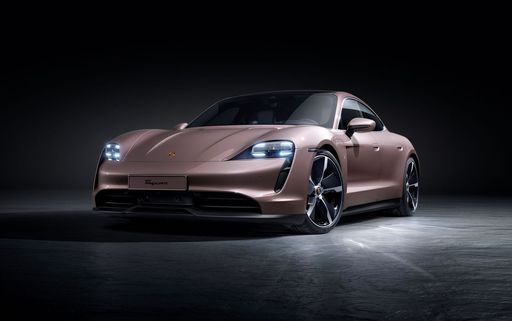
Porsche Taycan
Costs and Consumption
View detailed analysis
Engine and Performance
View detailed analysis
Dimensions and Body
View detailed analysis
Land Rover Range Rover Sport
The Range Rover Sport pairs unapologetic presence with genuine capability, looking like it belongs on a red carpet while quietly promising to tackle rough tracks when called upon. Inside, the cabin pampers with plush materials and thoughtful tech, making it an irresistible choice for buyers who want luxury, confidence and a touch of adventure.
details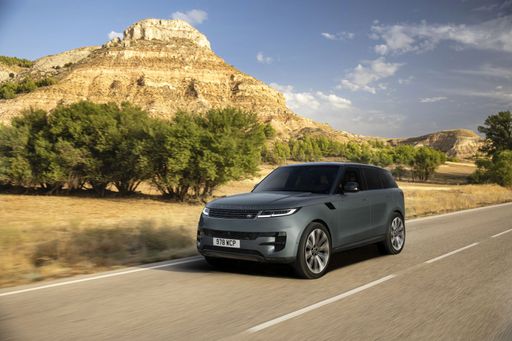
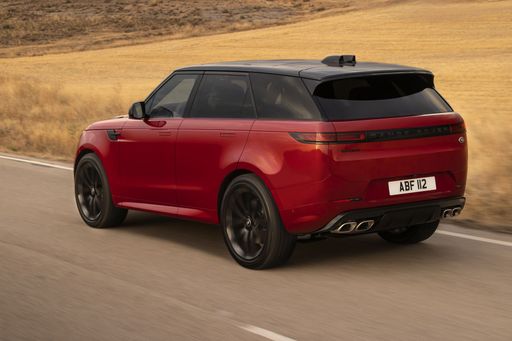
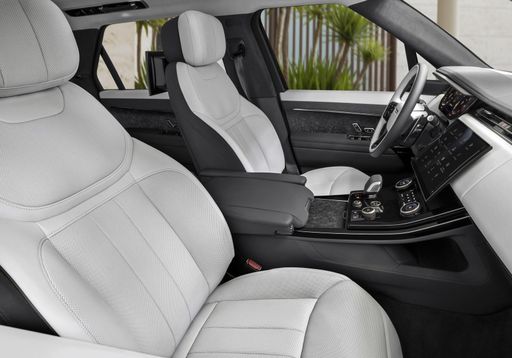
Porsche Taycan
The Porsche Taycan blends Porsche's razor-sharp handling with electric immediacy, delivering an exhilarating, near-silent shove that still feels unmistakably sporty. Inside it's a high-tech cockpit wrapped in premium materials, making it as rewarding to live with day to day as it is thrilling to drive on a twisty road.
details
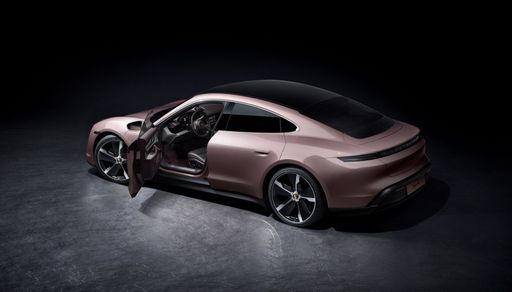
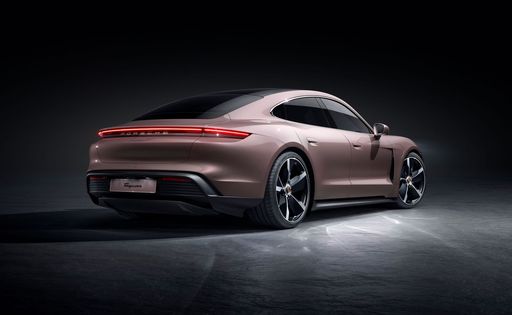
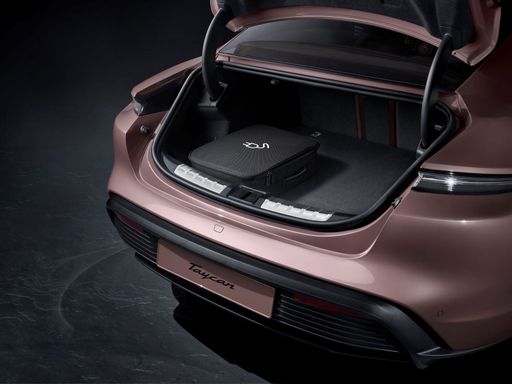
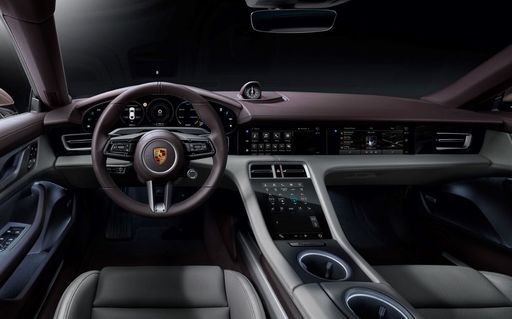
Costs and Consumption |
|
|---|---|
|
Price
78600 - 175700 £
|
Price
87900 - 206700 £
|
|
Consumption L/100km
2.7 - 11.7 L
|
Consumption L/100km
-
|
|
Consumption kWh/100km
-
|
Consumption kWh/100km
16.7 - 20.7 kWh
|
|
Electric Range
116 - 118 km
|
Electric Range
552 - 680 km
|
|
Battery Capacity
-
|
Battery Capacity
82.3 - 97 kWh
|
|
co2
61 - 266 g/km
|
co2
0 g/km
|
|
Fuel tank capacity
90 L
|
Fuel tank capacity
-
|
Dimensions and Body |
|
|---|---|
|
Body Type
SUV
|
Body Type
Coupe
|
|
Seats
5
|
Seats
4
|
|
Doors
5
|
Doors
4
|
|
Curb weight
2390 - 2810 kg
|
Curb weight
2165 - 2370 kg
|
|
Trunk capacity
647 L
|
Trunk capacity
326 - 407 L
|
|
Length
4970 mm
|
Length
4962 - 4968 mm
|
|
Width
2043 mm
|
Width
1966 - 1998 mm
|
|
Height
1814 mm
|
Height
1378 - 1381 mm
|
|
Max trunk capacity
1491 L
|
Max trunk capacity
-
|
|
Payload
640 - 830 kg
|
Payload
175 - 635 kg
|
Engine and Performance |
|
|---|---|
|
Engine Type
Plugin Hybrid, Petrol MHEV, Diesel MHEV
|
Engine Type
Electric
|
|
Transmission
Automatic
|
Transmission
Automatic
|
|
Transmission Detail
Automatic Gearbox
|
Transmission Detail
Reduction Gearbox
|
|
Drive Type
All-Wheel Drive
|
Drive Type
Rear-Wheel Drive, All-Wheel Drive
|
|
Power HP
249 - 635 HP
|
Power HP
408 - 1034 HP
|
|
Acceleration 0-100km/h
3.8 - 7.7 s
|
Acceleration 0-100km/h
2.2 - 4.8 s
|
|
Max Speed
290 km/h
|
Max Speed
230 - 305 km/h
|
|
Torque
570 - 800 Nm
|
Torque
410 - 1340 Nm
|
|
Number of Cylinders
6 - 8
|
Number of Cylinders
-
|
|
Power kW
183 - 467 kW
|
Power kW
300 - 760 kW
|
|
Engine capacity
2997 - 4395 cm3
|
Engine capacity
-
|
General |
|
|---|---|
|
Model Year
2025
|
Model Year
2024 - 2025
|
|
CO2 Efficiency Class
B, G
|
CO2 Efficiency Class
A
|
|
Brand
Land Rover
|
Brand
Porsche
|
Is the Land Rover Range Rover Sport offered with different drivetrains?
The Land Rover Range Rover Sport is offered with All-Wheel Drive.




